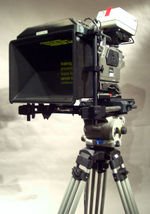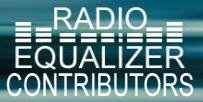WHDH-7 Boston, Talk Radio, Newsroom Meltdown
TALKERS VS. ANCHORS
Boston Newscast Meltdown Reveals Great Distinction
When it comes to television news anchors who read scripts from TelePrompTer devices, versus radio talk show hosts who ad lib for three or more hours at a time, can the average media consumer make a distinction?
three or more hours at a time, can the average media consumer make a distinction?
Under normal circumstances, perhaps not, but a primetime newscast meltdown at one of Boston's biggest television stations Thursday night has truly highlighted the difference between some radio and television personalities. Without electronic assistance, can many TV news anchors function on the air?
During WHDH-7's 11pm newscast, a computer malfunction left the Boston NBC affiliate's anchors without their scripts. In addition, it seemed to prevent them from cutting away to field reporters for live updates.
Without their customary tools of the television news trade, Channel 7's newscast was aborted after a just couple of minutes. As it became clear they were on their own, flustered anchors became increasingly panicked, ultimately leading to an on- air disaster of epic proportions. See the stunning video of this fiasco here.
 From the Boston Herald's Jesse Noyes:
From the Boston Herald's Jesse Noyes:
Your Radio Equalizer agrees with these "industry insiders": if these anchors are so unfamiliar with the stories they were about to introduce that they couldn't have ad libbed at least part of the newscast, are they little more than talking heads? Had they found some way to improvise, perhaps with a hard copy script for guidance, imagine the respect they could have earned.
Contrast that with talk radio, where hosts are expected to improvise for three or four hours at a time, usually with little more than a highlighter pen and a few wire story printouts. In the Radio Equalizer's case, a single page with bullet points on the main headlines accompanies a stack of articles for each program.
The primary exception, of course, is Air America Radio, where hosts have teams of writers, a strange concept they may have borrowed from National Public Radio.
Granted, hosts and anchors and anchors do have differing roles, with the former giving opinions, while the latter are expected to stick to the facts. And radio people are rarely able to function especially well in a television setting (with yours truly as Exhibit "A").
But a situation like what occurred at WHDH-7 actually reveals more about talk radio's inner workings than that of television news.
 How so? It's because talkers frequently run up against industry executives who wrongly believe that anyone can host a talk show. Like tennis, doesn't it look easy?
How so? It's because talkers frequently run up against industry executives who wrongly believe that anyone can host a talk show. Like tennis, doesn't it look easy?
But if experienced television anchors, used to facing the public, can't ad lib for a few minutes, why should the average celeb / columnist / councilmember / sports figure be expected to perform any better? And yet, they are given talk hosting slots on a daily basis, with typically horrible results.
Your Amazon orders that begin with clicks here, regardless of what you ultimately purchase, help to support the Radio Equalizer's efforts. Thanks for your vital assistance!
Top right anchor image: Boston Herald
Boston Newscast Meltdown Reveals Great Distinction
When it comes to television news anchors who read scripts from TelePrompTer devices, versus radio talk show hosts who ad lib for
 three or more hours at a time, can the average media consumer make a distinction?
three or more hours at a time, can the average media consumer make a distinction?Under normal circumstances, perhaps not, but a primetime newscast meltdown at one of Boston's biggest television stations Thursday night has truly highlighted the difference between some radio and television personalities. Without electronic assistance, can many TV news anchors function on the air?
During WHDH-7's 11pm newscast, a computer malfunction left the Boston NBC affiliate's anchors without their scripts. In addition, it seemed to prevent them from cutting away to field reporters for live updates.
Without their customary tools of the television news trade, Channel 7's newscast was aborted after a just couple of minutes. As it became clear they were on their own, flustered anchors became increasingly panicked, ultimately leading to an on- air disaster of epic proportions. See the stunning video of this fiasco here.
 From the Boston Herald's Jesse Noyes:
From the Boston Herald's Jesse Noyes:Channel 7’s decision to cut short its 11 p.m. newscast Wednesday night after it suffered a “meltdown of technology” left industry experts scratching their heads.
A control room switch, which ran everything from the news feeds to the cameras, failed, prompting the station to cancel its newscast in favor of airing MSNBC’s coverage of an arrest in the JonBenet Ramsey case.
“This particular piece of equipment really controlled the whole flow of the show,” said General Manager Michael Carson.
Indeed, within 30 seconds of the start of the newscast anchors Randy Price and Christa Delcamp said they were cutting to commercials. When the station returned,they attempted to jump to a filed report about an arrest in the Ramsey case but instead got a still picture with no sound for 45 seconds.
It was the “biggest train wreck I’ve ever seen in television news, ever,” said one industry insider.
Carson said continuing the newscast would have been impossible since many local reports are filed from the field and other feeds from other news sources were inaccessible. “It just wouldn’t have worked,” he said.
But some industry insiders argued the show could have gone on, minus the bells and whistles. “To say if we lose our technology, we lose our journalist is a dangerous position,” said one industry insider from a competing station.
Your Radio Equalizer agrees with these "industry insiders": if these anchors are so unfamiliar with the stories they were about to introduce that they couldn't have ad libbed at least part of the newscast, are they little more than talking heads? Had they found some way to improvise, perhaps with a hard copy script for guidance, imagine the respect they could have earned.
Contrast that with talk radio, where hosts are expected to improvise for three or four hours at a time, usually with little more than a highlighter pen and a few wire story printouts. In the Radio Equalizer's case, a single page with bullet points on the main headlines accompanies a stack of articles for each program.
The primary exception, of course, is Air America Radio, where hosts have teams of writers, a strange concept they may have borrowed from National Public Radio.
Granted, hosts and anchors and anchors do have differing roles, with the former giving opinions, while the latter are expected to stick to the facts. And radio people are rarely able to function especially well in a television setting (with yours truly as Exhibit "A").
But a situation like what occurred at WHDH-7 actually reveals more about talk radio's inner workings than that of television news.
 How so? It's because talkers frequently run up against industry executives who wrongly believe that anyone can host a talk show. Like tennis, doesn't it look easy?
How so? It's because talkers frequently run up against industry executives who wrongly believe that anyone can host a talk show. Like tennis, doesn't it look easy?But if experienced television anchors, used to facing the public, can't ad lib for a few minutes, why should the average celeb / columnist / councilmember / sports figure be expected to perform any better? And yet, they are given talk hosting slots on a daily basis, with typically horrible results.
Your Amazon orders that begin with clicks here, regardless of what you ultimately purchase, help to support the Radio Equalizer's efforts. Thanks for your vital assistance!
Top right anchor image: Boston Herald



5 Comments:
I wonder if they use Parkervision there. It's caused all sorts of havok for a Tallahassee station. I find it hard to believe that a large-market station doesn't give its anchors paper scripts as backups in case the teleprompter goes down. Plus the producer of the show must have completely been inept if he or she couldn't adapt on the fly like a good producer should. There's more to this story than we're being told. Heck, even in this small market, the station I worked for would just go to break, regroup and come back. There's only been a handful of instances where the computerized equipment (e.g. - Parkervision) fouled up badly enough to screw up most of a newscast, but we had backups. It's pathetic that the large-market station didn't have backups in place.
By Carl, at 19 August, 2006 05:01
Carl, at 19 August, 2006 05:01
And what's with their hands? Waving them all over the place. What a riot!
I lived in Boston for many years and remember Randy Price. It was amazing to see how both of the anchors crashed without their prompter.
So now we have the proof that the only reason these talking heads get the big bucks is because they look good on TV. They are not the sharpest knives in the drawer, if you get my drift.
Brian, your comparison with talk-show anouncers is right-on. I have often wondered how they could run a 3-hour off-the-cuff show with no ahs, umms, or uhs.
.
By The Benson Report, at 19 August, 2006 10:06
The Benson Report, at 19 August, 2006 10:06
Well, WHDH is run by Sunbeam TV, Edward Ansin's company which also runs WSVN Fox 7 in Miami. Both stations have flashy, fast-paced almost tabloid presentations in their newscasts. They also use the same Circle 7 logo.
From what I've read about Boston's channel 7, it's always been an also-ran to WBZ CBS 4 and WCVB Channel 5. At one point, 7, as WNAC-TV in the early 1970's was a contender with a young anchorman and his presentation of the news. Well, like Babe Ruth, he came to New York and has had a great track record. His name? Chuck Scarbourough--anchor at WNBC-TV New York.
By the way, I do not remember seeing any of the New York stations having a teleprompter malady. Besides, don't TV reporters have scripts in front of them at the anchor desk or have we gone paperless in reporting? Even some radio stations have paperless news services. Just click and drag and there you go. To be honest, I would be scared to do this because if that computer crashes, well you're up ****'* creek w/o a paddle.
By The Real Bob Anthony, at 19 August, 2006 10:44
The Real Bob Anthony, at 19 August, 2006 10:44
Almost all national talkers have a dead-roll available. Unfortunately, dead-roll doesn't work too well in TV.
Perhaps it's a manifestation of our affinity for technology - when things don't go precisely so, everything falls apart.
At the end of the newscasts, you always see the anchors shuffling papers. Do they work on their grocery shopping lists during the 'cast?
By SierraSpartan, at 19 August, 2006 22:51
SierraSpartan, at 19 August, 2006 22:51
I will never be able to look at Randy Price and Christa Delcamp the same way again.
By Steve Garfield, at 02 September, 2006 07:17
Steve Garfield, at 02 September, 2006 07:17
Post a Comment
<< Home